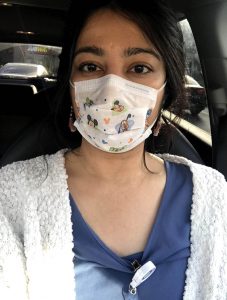
Don’t Let Fear of COVID-19 Prevent You from Addressing Serious Issues
Every morning, I step out of my car, grab my disinfected goggles from a paper bag and put on a mask as I make my way to my office at Overlake Hospital in Bellevue.
I walk into the clinic and am instantaneously surrounded by the smell of sanitary wipes, now part of our hourly cleaning routines. I am not greeted by the familiar smiles and eyes of my team, but glistening eye gear and enthusiastic “good mornings” muffled behind blue masks. It is the same thing I have done for months on end, but nothing about our environment is really familiar.
Where once our waiting rooms buzzed with patients, we now see empty chairs and signage of new protocols and procedures. COVID-19 has embedded fear into the hearts of our community and apprehension over routine doctor’s visits is scarring the industry with a drastic decrease in follow up on health maintenance of patients. “Patients feel afraid of coming into the practice,” is what I hear over and over again.
Organizations have mastered the art of PPE, both mental and physical, and our community is well aware of the importance of wearing the right mask, social distancing, and frequent handwashing. All great techniques for preventing the spread of COVID-19, but this unique crisis is also feeding a darker reality: the unmanaged patient with chronic conditions.
The commerce department showed an 18% decline in healthcare spending, which is staggering. We all know preventative medicine is key to addressing fatal outcomes; this is what primary care doctors aim to do: help prevent and manage acute/chronic conditions. But is fear of COVID-19 preventing patients from addressing serious issues? Absolutely yes. Our empty waiting rooms are proof of this.
Patients, some even in my own family, refuse to go to doctors out of fear of getting COVID-19. Unmanaged conditions, such as diabetes and hypertension, are being put on the back-burner, potentially resulting in fatal outcomes.
As a member of the healthcare community, I don’t think I can emphasize enough the importance of seeking medical help, not only when needed but also catered around prevention and follow ups. Patients’ fear of getting COVID-19 often stems from misinformation about management of the healthcare environment and protocols aimed at prevention and spread. For example, organizations such as my own now offer both virtual and onsite visits. We have hourly cleaning protocols, socially-distanced waiting rooms, technology to schedule appointments at your own convenience, incredible gear for patient and staff protection, and the most drastic, redirecting patients who present with respiratory issues to a completely different location.
Yes, the world we live in has changed, but healthcare needs have not. I continue to worry about those patients who are not coming in to see our doctors and nurses. Our physician teams worry about outcomes and worsening of conditions when left untreated and unaddressed. Yes, organizations like mine treat the sickest of the patients, but we pride ourselves in knowing that protocols and adherence to strict guidelines allow for us to say you are “safe in our care.”







